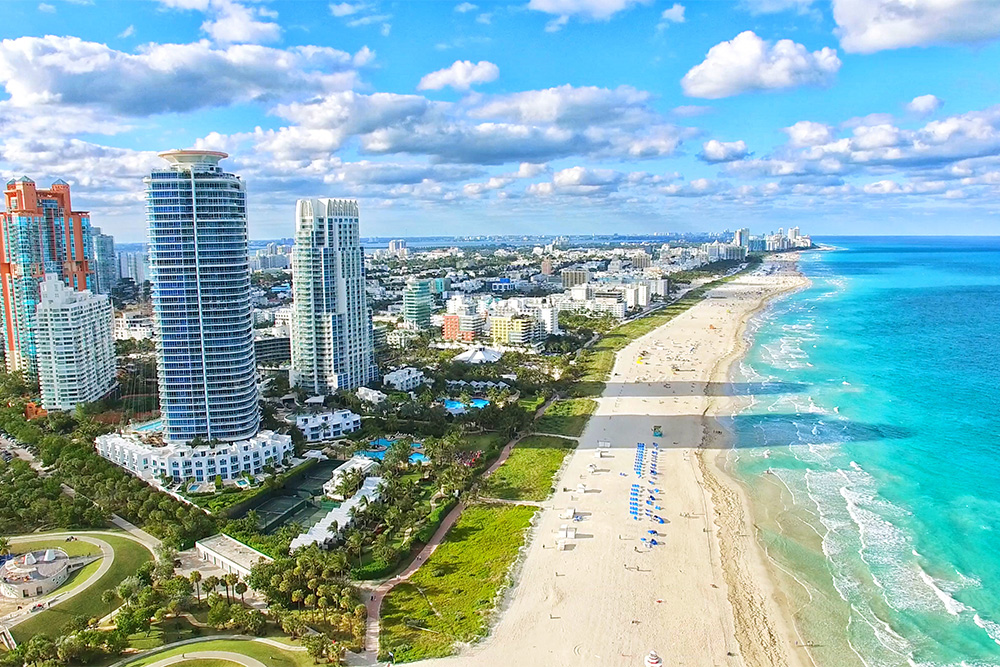Usa Buyer Guide
*That first thought
Buying property in the USA is possible for anyone. Like any big project, it takes a vision and a succession of small steps to take you closer and closer to your goal. Those who have successfully made the move or the purchase didn’t just make the decision one morning and move the next. Instead,they started with a daydream – excitement at the thought of a pristine villa in Florida next to a golf course, a field of wild flowers behind a cottage in the mountains, or a condo overlooking the beach with a BBQ big enough to cook a dozen hamburgers on.
These people dedicated their time to looking online for properties before reaching out to an estate agent (or ‘Realtor’, as they are called in the US, if they have passed the required exams). They researched their visa options and spent hours on expat blogs learning more about what it is actually like to live in and to buy property in the USA. They visited property shows, talked to property professionals, spoke to friends and acquaintances who had done the same, and carefully assessed their financial options to see whether the dream could be made into a reality. You can take all of these steps too – starting today!
Why not make this the year that you start working towards your dreams? Search the internet, go to an exhibition for property investors, and book a visit. Create a journal outlining everything you want and focus on how great it will be to have your own place in the USA. Somewhere in Florida, perhaps, where you can enjoy regular holidays and generate a bit of rental income, or somewhere to move to permanently and enjoy a completely new lifestyle.
*Can you actually buy property in the USA?
There are no restrictions on foreigners buying property anywhere in the USA. However, taxes and general buying requirements do differ from state to state. We highly recommend finding an experienced realtor and a professional legal firm in the state in which you are house hunting,as they will be the people best served to properly explain procedures. In the USA, realtors that buy and sell properties are licensed and regularly assessed
to maintain standards. It’s important not to presume that just because there’s no language barrier everything will be the same - the USA is still a foreign country.You must make sure that you understand the rules and visa requirements as a foreigner well in advance of looking for your property. Those that apply to you will depend on whether you want to move to the US permanently, or just plan on using the property as a holiday home.
*The first step – find out what you want
As soon as you decide that you want to buy in the US, you need to sit down and think about your reasons for doing so. What are you looking for? Put pen to paper and make a note of the following:
Buying a home:
• If you want to buy a property to use as a home, what would make it perfect?
• Where is the perfect location for you and your family?
• What kind of community works best for you?
• How many bedrooms or bathrooms do you need?
• Would you like a pool? Off-road parking?
• How long would it ideally take you to drive to work and to your children’s schools?
• If you plan on spending a lot of time at the beach, or on the golf course, how close would you like to be?
Buying-to-let
• If you are thinking about renting out the property, what kind of tenants do you wish to attract? Families or young professionals?
• Which towns or suburbs are closest to the areas and amenities that will appeal to renters?
• What facilities will make your property particularly desirable to renters? A pool, a gym, onsite parking?
• What rental yield can you expect to achieve?
How much do you need to achieve?
Buying as an investment
• If finding a long-term investment is your focus, which future developments offer the best investment package?
• Which areas are going to be made more desirable by future infrastructure changes?
• What return on investment is likely?
*Do you need a visa, your questions answered?
It is important to research the different visa options applicable to you and what is required to get one as early as you can, as this can be a time consuming and confusing process, yet vital to your USA property
purchase.
1) Do I need a visa to buy US property?
No. Just like in the UK, you can buy a property in the USA without a visa or any special paperwork. Neither do you necessarily need a visa to travel to the US and look for/buy the property. British people can travel to the US under the Visa Waiver Programme, so long as they have an up to-date e-passport, have gone online to obtain their ESTA (Electronic System for Travel Authorisation), have a return ticket and are able to state where they will be staying while in the US. The VWP allows you to make multiple entries to the US and stay for up to three months of the year. If you wish to stay longer than that you will have to obtain a visa.
2) If I buy a property, will I be able to stay in the US?
No. Buying residential property does not in itself give you any rights to live in the US. If however, you open a business that could include accommodation you may be able to obtain an E5 investor visa.
3) What is the simplest option for buying a property?
The Visa Waiver Programme (VWP). Under the VWP most British people can visit the USA for up to 90 days for business or pleasure without a visa. You will need an e-passport with an electronic chip and logo on the cover. The older style machine readable passports will not allow entry. You will also have to obtain an ESTA (Electronic System for Travel Authorisation). Applying online is simple and will set you back just $14 (£11). You don’t have to send off your passport, it is recorded on the electronic version. The ESTA is valid for multiple trips to the US of up to 90 days each, over a period of two years or until your passport expires, whichever comes first. The ESTA will be refused if you have a criminal conviction (or possibly if you have just been arrested, even if that didn’t end in a conviction), certain illnesses and anyone who has previously overstayed their visa or been deported. If the ESTA is refused you may still get in, but will have to obtain a visa and attend an interview at the embassy.
4) What if I want to spend longer than 90 days there?
To stay more than 90 days or if you wish to work or study you will need to get a visa. American visas divide into immigrant visas and non immigrant visas. Non-immigrant visas: There are more than 20 non-immigrant visas, but the usual visa for British people buying property, not working but aiming to stay longer than 90 days, is the B-2 Visa. It is still a tourist visa and doesn’t allow you to work at all, but it does allow you to stay in America for up to six months.
*The buying process
The exact buying process in the USA depends on State law. Don’t let this put you off though, there is no language barrier and the industry is incredibly well-regulated and transparent.
Step 1 :
Make an offer
Once you have found the property that you wish to make an offer on, your realtor will put in an oral offer on your behalf. This will usually spark a negotiation of price, terms and closing date, until you reach an offer that both buyer and seller are pleased with.
Step 2:
Contract of sale
Once the offer has been accepted, the seller’s attorney will begin drafting a contract of sale. This document will contain a review of all of the documentation applying to the property ,including:
• the deed;
• title insurance policy;
• notes on the mortgage;
• certificates of occupancy;
• all tax and utility bills; and
• any leases and permits relating to the property.
While this is happening, the buyer’s attorney will be examining all of the financial records for the property.
Once you receive the contract of sale back from the seller, your attorney will review and negotiate on the terms.
Step 3:
Signing the contract
Once your attorney is satisfied that both the financials of the property and the contract of sale are satisfactory, you will sign the contract.
Important note: Until all parties concerned have signed the contract, the seller is well within their rights to entertain offers from other buyers.
Once the first contract is signed, a closing date will be decided. On this date all obligations of the contract MUST be finalised. This will generally be 30 days from the signing of the first contract.
Step 4:
Paying the deposit
Once the contract is signed by both parties, it becomes legally binding and it is time for the buyer to pay the deposit. This is usually paid into the escrow account of the attorney of the seller and will only be released once everything is finalised.
Step 5:
Property surveys
It’s important that you have it written into the contract that the sale is subject to the results of your property surveys. At this stage, a licensed home inspector will visit the property to identify any issues or repairs that are needed. Additionally, an appraiser will visit the property to provide a detailed report of the property’s market value. A title search will also be conducted to ensure that the property is free from any charges.
Remember, when you put an offer in on a property you are doing so based on the condition it is in at the time. As you will not be able to bring up any defects after this point, you need to ensure you’re completely aware of and happy with the condition of the property before you make an offer.
Always have a survey or ‘Inspection Report’ carried out on the property before you make an offer. This will identify any defects with the property that could help you to negotiate a lower price.
Step 6:
Insurance
Between the signing of the first contract and the closing of the sale, insurance should be obtained to protect you, should any issues surrounding the title of the property arise, for example, if another person has an interest in the property that may not have been disclosed, such as a previous lender with a partial claim on the title. Title insurance protects you, the buyer, from any expenses or loss you may experience as a result of such a defect (sometimes known as a ‘cloud’).
Step 7:
Closing the sale
Again, the State that you are buying the property in will dictate the exact closing procedures that you will be subjected to. In general, all parties are present, all documents are finalised and then money, information and documentation are exchanged and the property becomes yours.



